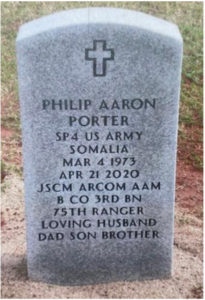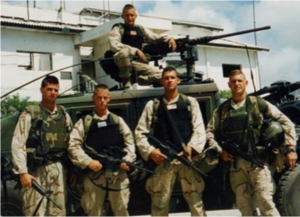Scroll of Honor – Philip Aaron Porter
A Special Memorial Day
Written by: Kelly Durham
Next Monday is Memorial Day, a day on which we honor those who  died while serving our country in its armed forces. This year, Memorial Day weekend on the Clemson campus will include a special ceremony at the Scroll of Honor Memorial as we add Philip Aaron Porter to the names engraved around the Memorial’s barrow. The service, to which the public is invited, will begin at 4 p.m. this Sunday.
died while serving our country in its armed forces. This year, Memorial Day weekend on the Clemson campus will include a special ceremony at the Scroll of Honor Memorial as we add Philip Aaron Porter to the names engraved around the Memorial’s barrow. The service, to which the public is invited, will begin at 4 p.m. this Sunday.
Porter’s story is unusual in several aspects: his passing is the most recent among all the heroes listed on Clemson’s Scroll of Honor; his military service predated his enrollment at and graduation from Clemson; and his sacrifice was not the result of a sudden catastrophe on the field of battle, but rather the consequence of an insidious affliction incurred while serving in a Third World combat zone.
Porter was born in Easley and grew up in Pickens. Following high school, he enlisted in the Army in August 1991. After completing basic training at Fort Jackson, Porter trained to become a radio operator. He also earned his parachutist jump wings. With this training behind him, Porter was assigned to the elite 75th Ranger Regiment.
In December 1992, President George H. W. Bush ordered the US military to join United Nations Operation Restore Hope to stabilize order in Somalia. That country had been racked by famine and civil war and was being ruled by competing warlords. When President Bill Clinton took office the following month, he maintained the American commitment.
In May 1993, the parties involved in the civil war agreed to a disarmament conference proposed by warlord Mohamed Farrah Aidid, who had declared himself Somalia’s president. But on June 5, UN forces were ambushed in Aidid-controlled Mogadishu and twenty-four Pakistani soldiers were killed. The next day, the UN Security Council passed Resolution 837 calling for the arrest and trial of those responsible for the ambush. Despite attacks on his stronghold by UN troops and US warplanes, Aidid remained defiant.
Following two more ambushes targeting American troops, President Clinton authorized the deployment of Task Force Ranger, consisting of four hundred Army Rangers and Delta Force operators. Specialist Porter served with Task Force Ranger from August to October 1993 during what came to be known as the Battle of Mogadishu. The fighting, in what was considered the most difficult close combat US troops had participated in since the Vietnam War, resulted in the apprehension of key Aidid allies but also the deaths of eighteen US, one Malaysian, and one Pakistani soldier.
During the course of the battle, Porter, on October 3 and 4, was engaged in the fighting. According to the citation for his Joint Services Commendation Medal,
Porter helped his element fight through two ambushes and a roadblock, then met another Task Force Ranger element coming back from the objective with casualties… He quickly helped transfer them into the 5-ton he was traveling in, secured the area… all while under sporadic enemy fire.
Yet Porter’s heroic actions exacted a price. During his active duty, Porter suffered a back injury that manifested as a protruding disc. This injury was diagnosed by the Army prior to Porter’s honorable discharge from the service in May 1995. Medications used to treat these issues brought on further health problems.
Despite these issues, Porter enrolled at Clemson in 1997,  pursuing a degree in horticulture with a minor in urban forestry. While attending Clemson, Porter worked to help restore the Schoenike Arboretum at the SC Botanical Garden. He later served as Arboretum Manager. Professor Mary Taylor Haque remembers Porter as “strong, robust, and active. What an addition he was to the Clemson University Department of Horticulture, the South Carolina Botanical Garden, and the surrounding community… He was always kind, caring, well-mannered, and supportive of his colleagues.” Karl Pokorny, a friend who worked with Porter at Clemson, recalled Porter as “an honest, loyal friend; the kind of guy who would throw himself on a hand grenade to save you. He was brave, a true gentleman, and patriot. He applied himself to and studied everything he took an interest in and worked hard. Doing tree jobs with him was more fun than work.”
pursuing a degree in horticulture with a minor in urban forestry. While attending Clemson, Porter worked to help restore the Schoenike Arboretum at the SC Botanical Garden. He later served as Arboretum Manager. Professor Mary Taylor Haque remembers Porter as “strong, robust, and active. What an addition he was to the Clemson University Department of Horticulture, the South Carolina Botanical Garden, and the surrounding community… He was always kind, caring, well-mannered, and supportive of his colleagues.” Karl Pokorny, a friend who worked with Porter at Clemson, recalled Porter as “an honest, loyal friend; the kind of guy who would throw himself on a hand grenade to save you. He was brave, a true gentleman, and patriot. He applied himself to and studied everything he took an interest in and worked hard. Doing tree jobs with him was more fun than work.”
Continued treatment of Porter’s service-related conditions eventually led to the diagnosis of an even more serious infection, like the others connected to his time on active duty. Veterans Administration doctors determined that conditions in Somalia, including the lack of clean drinking water and exposure to environmental toxins released into the air by the burning of tires—a tactic used by Somali militias to block roads—aggravated Porter’s afflictions.
Despite his bravery and toughness, Porter was unable to overcome  these hidden enemies. He died on April 21, 2020. He was survived by his wife, Tiffany, and sons Eli and Grayson. He is memorialized at the Dolly Cooper Veterans Cemetery in Anderson.
these hidden enemies. He died on April 21, 2020. He was survived by his wife, Tiffany, and sons Eli and Grayson. He is memorialized at the Dolly Cooper Veterans Cemetery in Anderson.
With his passing, Pokorny says, “The world lost one of the good guys – in fact, one of the best of the good guys.“
For more information about Philip Aaron Porter see:
https://soh.alumni.clemson.edu/scroll/philip-aaron-porter/
For additional information about Clemson University’s Scroll of Honor visit:
https://soh.alumni.clemson.edu/

